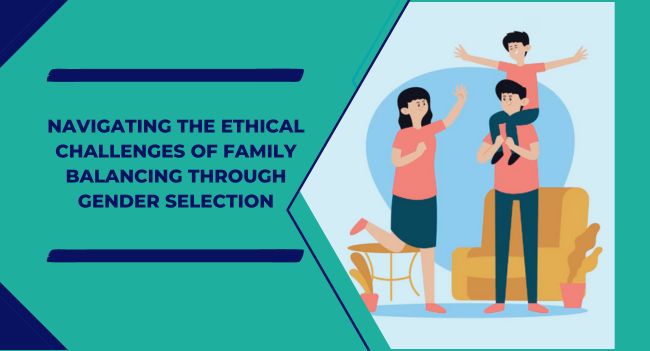
A “Family balancing” is one in which there is an equal number of male and female children. Many parents desire to complete their families with a son or a daughter, who would balance their family.
With advanced ART-based technology, Family balancing is possible. However, gender selection for non-medical reasons as part of family balancing has become a controversial topic and has sparked critical ethical questions that deserve our attention.
In this blog, we’ll explore what gender selection is, the reasons behind this process, and the ethical principles guiding our decisions.
Family balancing refers to the desire of some individuals or couples to have a balanced gender distribution among their children. It is the practice of deliberately choosing to have children of different genders to achieve a specific gender composition within the family.
For instance, a couple with two sons may desire a daughter as their next child to balance the genders in their family.
Gender selection is the process of intentionally choosing the sex or gender of a child before conception or during the early stages of pregnancy. It is a method to achieve Family balancing by ensuring that the desired gender is conceived.
However, it’s important to note that gender selection can also be used for other reasons, such as to prevent sex-linked genetic diseases.
Patients usually consider gender selection for two reasons:
Family balancing through gender selection is a deeply personal decision for couples. Before considering any method, it is crucial for individuals to understand the legal and ethical implications in the country and to consult with healthcare professionals to explore the available options and make informed choices.
Gender selection methods are techniques used to increase the likelihood of conceiving a child of a specific gender. Here are some standard methods of gender selection:
Family balancing through gender selection poses several ethical challenges that have been subject to debates and discussions within the medical, legal, and ethical communities.
Some of the key ethical concerns include:
It is crucial for society to engage in open, informed, and respectful discussions regarding family balancing through gender selection.
Legislation and regulations may need to address some of these ethical challenges and ensure that the practice, if permitted, is conducted carefully, considering the potential consequences on individuals and society.
Patient autonomy and reproductive liberty is the right of the patient to make decisions about their medical care without their healthcare provider trying to influence the decision.
Patient autonomy allows the healthcare providers to educate the patient, but does not allow them to decide for the patient. Parents may have their reasons to parent a child of a particular sex.
Parents undergoing IVF for medical reasons may wish to include PGT for sex selection. Parents who cannot conceive naturally may seek In Vitro Fertilization (IVF) with PGT for sex selection to avoid unnecessary pregnancy termination of the undesired sex.
For more information on gender selection and family balancing, please get in touch with Dr. Partha Das.
Dr. Partha Das leads one of the best family balancing in Dubai, offering safe and highly effective consultations and treatments. If you are a parent planning your next child, feel free to consult him to learn more about family balancing.

Dr Partha Das is a highly skilled fertility/IVF Physician specializing in Reproductive Endocrinology and Infertility. Dr Partha consults and manages patients presenting with complex gynecological, male and female infertility issues and management of recurrent miscarriage and IVF failures.